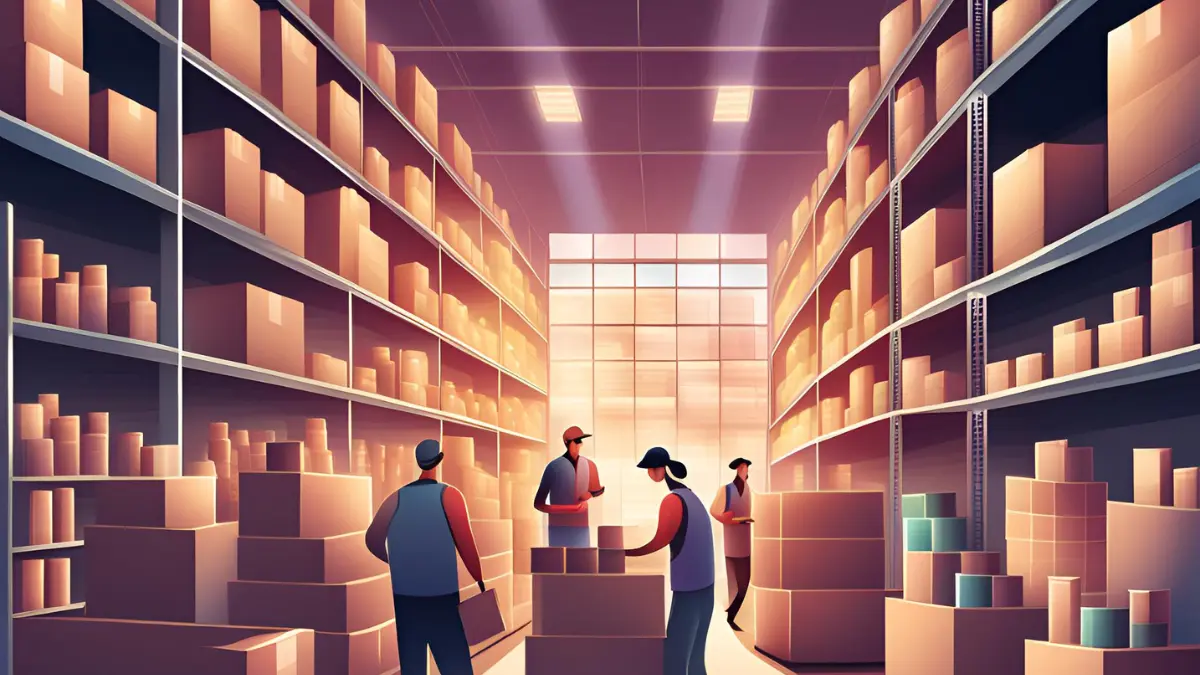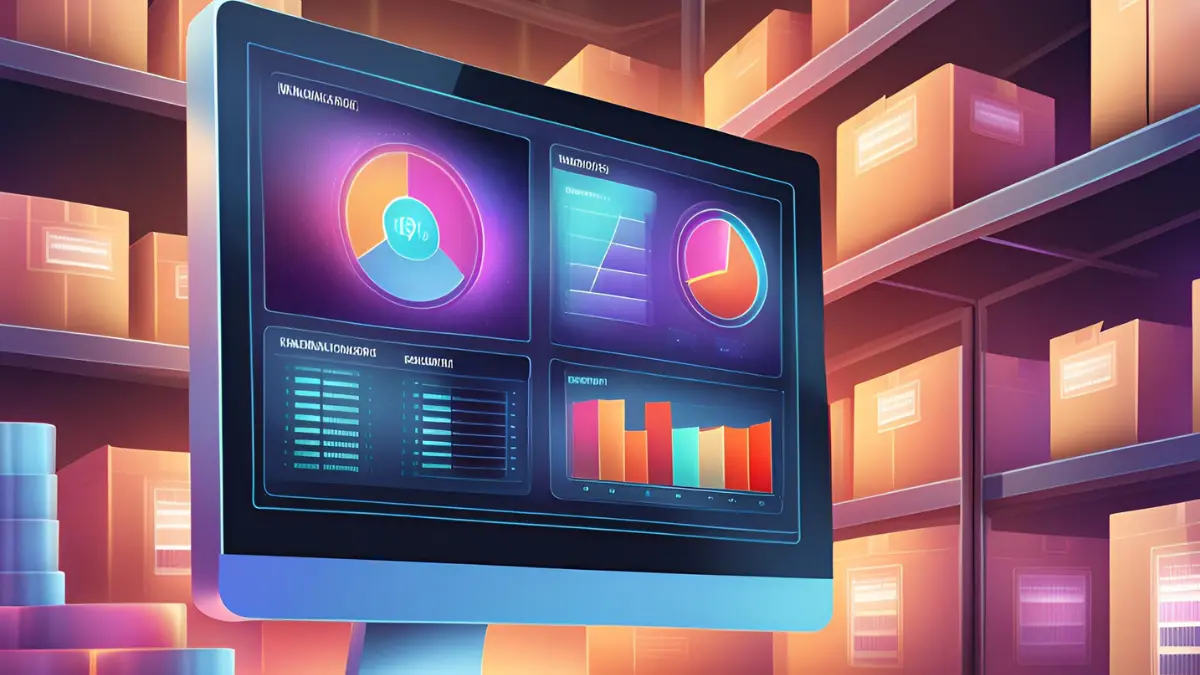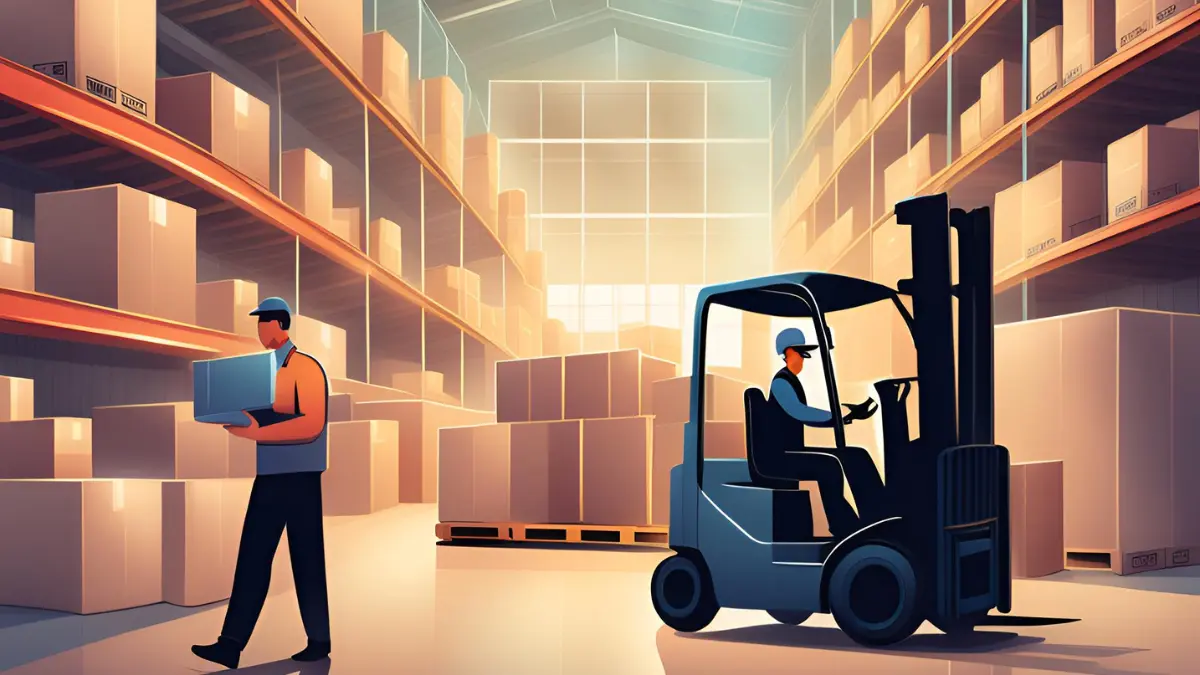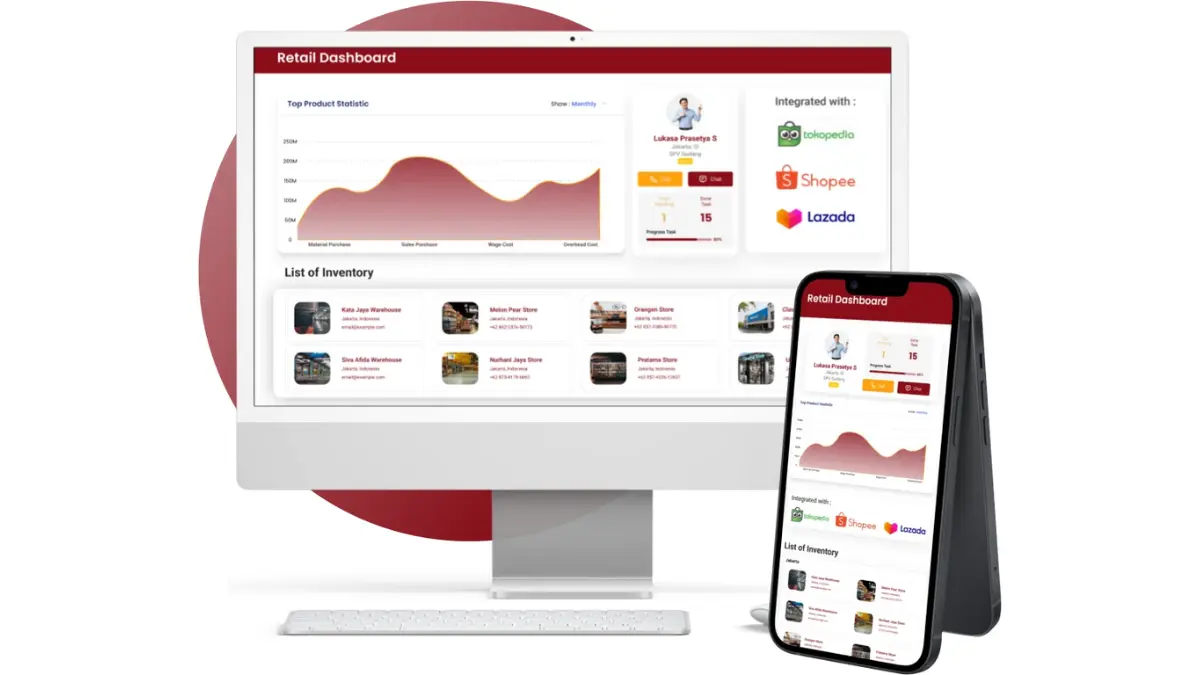A retail warehouse is a facility where businesses store their inventory and process customer orders. It serves as a central hub for receiving, storing, and distributing products, ensuring that goods are efficiently managed and delivered to customers on time.
Without the right software, managing stock levels in a retail warehouse becomes a significant challenge, leading to issues like overstocking, understocking, and inaccurate inventory counts. These problems can result in delays, increased storage costs, and inefficient stock retrieval.
However, using the right software is crucial for addressing these challenges. According to a survey, more retailers are adopting automation technologies such as AI-powered customer service bots, self-checkout systems, and cashier-less stores.
These innovations boost efficiency, streamline processes, and improve customer experience while reducing costs. How can your business benefit from the right retail warehouse software? This article explores a retail warehouse and its benefits for Singaporean businesses.

Key Takeaways
|
What is a Retail Warehouse?
A retail warehouse is a facility where a seller’s inventory is stored and online orders are processed for fulfillment. These warehouses play a critical role in the retail supply chain by handling everything from storing products to packaging and delivering goods to consumers.
Retail warehouses are essential for maintaining an efficient flow of goods, ensuring that items are available for customers when needed. They help retailers meet customer demand promptly by optimizing storage and order fulfillment processes. A POS system integrates seamlessly with warehouse operations, streamlining inventory management and order processing to further enhance efficiency.
Additionally, retail warehouses enable businesses to scale operations as demand grows, providing the necessary infrastructure to support both physical and online sales. This integration between storage, packaging, and delivery ensures seamless operations that enhance customer satisfaction.
Types of Retail Warehousing

Retail warehousing comes in various types, each designed to meet specific business needs and operational demands. Understanding the different types of retail warehousing is essential for selecting the right solution that aligns with your company’s goals and logistics.
In the following sections, we will explore the key types of retail warehousing and how each can benefit your business operations.
-
Cooperative warehouse
A cooperative warehouse is jointly owned and operated by multiple businesses or organizations. This type of warehouse allows members to share storage costs, making it an economical option for small to medium-sized enterprises. Moreover, cooperative warehouses offer better service and flexibility since all members share common goals.
-
Private warehouse
Private warehouses are owned and operated by one company, typically larger retailers or manufacturers. This warehouse type provides greater control over storage, inventory, and distribution processes, ensuring higher efficiency. However, due to the higher costs, private warehouses are best suited for businesses with substantial storage needs.
-
Public warehouse
Public warehouses are third-party facilities available to businesses on a rental basis, making them accessible for short-term or seasonal storage. They are ideal for companies looking to reduce capital investments in warehouse infrastructure. Additionally, public warehouses often provide services such as inventory management and order fulfillment, which can further ease operational burdens.
-
Smart warehouse
An intelligent warehouse integrates advanced technology like automation, artificial intelligence, and robotics to streamline storage and distribution. This warehouse type significantly improves accuracy, speed, and overall efficiency, helping businesses reduce human error and operational costs. Consequently, smart warehouses are becoming increasingly popular among companies aiming for scalable and future-ready operations.
Implementing a Warehouse Management System in Singapore is essential to improving efficiency and profitability. It streamlines inventory management and automates key processes. If you’d like to learn more, try the free demo offered by HashMicro to explore how this solution can benefit your business.
Benefits of Retail Warehousing Software

Retail warehousing is critical in optimizing retail inventory management and ensuring seamless operations. By utilizing effective warehousing strategies, businesses can streamline their supply chain and improve order fulfillment.
Additionally, partnering with third-party logistics providers can further enhance efficiency, offering cost-effective solutions for storage and distribution. Below are the benefits offered by the retail warehouse:
1. Cost savings through bulk storage
Retail warehouses allow businesses to purchase and store products in bulk, leading to significant cost savings. Bulk buying often comes with discounts, reducing the overall cost of goods. Additionally, storing large quantities helps protect businesses from price fluctuations. In the long run, these savings can enhance profitability and offer a competitive edge.
2. Increased storage capacity
Warehousing offers businesses the space needed to accommodate large inventories, which is crucial for growth. With more storage capacity, companies can expand their product offerings without worrying about space constraints. This extra room allows them to meet customer demands efficiently. Furthermore, it supports future scaling as the business grows.
3. Efficient management
Retail warehouses are equipped with systems that streamline inventory management, making it easier to track stock levels. This results in fewer errors and helps avoid stockouts or overstock situations. Efficient management also leads to better forecasting, allowing businesses to plan more accurately. As a result, companies can save time, reduce waste, and optimize their supply chain.
4. Streamlined order fulfillment
By consolidating products in one central location, warehouses make the order fulfillment process faster and more organized. This ensures that customers receive their orders promptly, boosting satisfaction and loyalty. With organized storage, picking and packing processes are also optimized. Therefore, businesses can fulfill orders accurately and meet delivery deadlines consistently.
5. Seasonal demand handling
Retail warehouses are invaluable when handling fluctuations in demand, especially during peak seasons. Businesses can stock up in advance, ensuring they have enough inventory to meet customer needs. This proactive approach prevents delays and stock shortages during busy periods. As a result, companies can maximize sales and maintain smooth operations year-round.
6. Enhanced security
Modern warehouses have advanced security measures, protecting inventory from theft or damage. These facilities often include surveillance systems, restricted access, and fire prevention protocols. By ensuring the safety of valuable goods, businesses can minimize risks and reduce insurance costs. Ultimately, enhanced security translates to greater peace of mind and business continuity.
After learning about the benefits of using automation in warehouse management for your retail business in Singapore, you might be considering which software solution is best for your needs. Click the banner below to calculate the best WMS Singapore solution tailored to support your business needs!
The Essential Functions of Retail Warehouses
Retail warehouses are crucial in ensuring smooth operations within the supply chain, especially for distribution centers and small-scale retailers. They serve as the backbone for efficiently storing, managing, and distributing goods, allowing businesses to meet customer demands promptly.
Before diving into the specifics, it’s crucial to understand how these warehouses function and their key contributions to the retail industry.
- Stores inventory: Retail warehouses provide secure spaces where businesses can store their products in bulk until needed. By keeping inventory organized and easily accessible, companies can efficiently manage stock levels and avoid running out of essential items.
- Fulfills orders to customers: These warehouses play a crucial role in fulfilling customer orders by picking, packing, and shipping products directly to them. With streamlined processes, businesses can ensure timely deliveries, increasing customer satisfaction.
- Fulfills orders to retail stores: Retail warehouses also distribute goods to physical stores, ensuring that shelves are consistently stocked. This efficient replenishment process helps businesses meet customer demand while avoiding stock shortages at store locations.
Major Warehousing Challenges Faced by Expanding Retailers

As retailers grow, their warehousing operations become more complex and present new challenges. Managing more extensive inventories, ensuring timely order fulfillment, and optimizing warehouse space are just a few hurdles impacting efficiency and profitability.
To stay competitive, retailers must effectively address these challenges, and understanding the most common issues is the first step toward improvement.
- Increased order volume: As retailers grow, the number of orders increases, putting pressure on warehousing operations. This surge can lead to delays, errors, and strained resources without proper systems in place.
- Inventory tracking complexities: With more products to manage, tracking inventory becomes increasingly complicated. Inaccurate data can result in stockouts or overstocking, affecting profitability and customer satisfaction.
- Space utilization and layout design: Maximizing available space while ensuring easy access to inventory is a constant challenge. Poor layout design can lead to inefficiencies in picking and storing, slowing down operations.
- Workforce management: As businesses scale, managing a larger workforce becomes more complex, especially during peak seasons. Ensuring employees are trained, and schedules are optimized is crucial for maintaining efficiency.
- Technology integration: Many growing retailers struggle to integrate advanced warehouse management systems with their existing processes. Without the right technology, it’s challenging to streamline operations and keep up with increasing demand.
- Lack of expertise: Expanding businesses often face a shortage of skilled personnel who understand efficient warehouse management. This knowledge gap can lead to operational inefficiencies, resulting in lost time and higher costs.
Solutions for Retail Warehouse Challenges

Managing a retail warehouse comes with numerous challenges, from optimizing retail inventory to ensuring smooth order fulfillment. Without the right tools, businesses risk inefficiencies that can lead to stock mismanagement and operational delays.
Fortunately, implementing solutions like a WMS in Singapore can address these issues and significantly enhance warehouse efficiency.
-
Advanced inventory management systems
Implementing advanced inventory management systems helps retailers track stock levels in real-time, reducing errors and improving accuracy. These systems provide better visibility across the supply chain, allowing businesses to manage stock more efficiently. As a result, companies can reduce overstocking, prevent stockouts, and meet customer demand promptly.
-
Optimal warehouse layout planning
Designing an optimal warehouse layout maximizes space utilization while ensuring smooth workflow. By organizing the warehouse into logical zones, businesses can reduce the time spent on picking and packing. This leads to faster order fulfillment and more efficient operations, especially during busy periods.
-
Workforce training and automation
Investing in workforce training ensures that employees are well-equipped to handle modern warehousing challenges. Businesses can reduce manual errors and improve overall productivity when paired with automation tools, such as robotic picking systems. Together, training and automation help create a more efficient and reliable workforce.
-
Implementing Warehouse Management Software
Warehouse management software provides a comprehensive solution for managing inventory, tracking orders, and optimizing warehouse operations. By integrating WMS into their operations, businesses can streamline processes, reduce operational costs, and enhance productivity. This technology also enables better decision-making by offering data-driven insights into warehouse performance.
Streamline Retail Warehouse Management with Solutions from HashMicro

HashMicro’s Warehouse Management System is one of Singapore’s best solutions for retail warehouse management. It seamlessly integrates with various systems, providing specific solutions tailored to each company’s unique needs, making operations more efficient and scalable.
Ready to experience the benefits of HashMicro’s Warehouse Management Software? Sign up for a free demo today and discover how this software can transform your retail warehouse management.
In addition to being highly effective, HashMicro offers a range of powerful features designed to optimize warehouse operations. These features will be discussed in detail below, providing an in-depth look at how they can streamline your business processes.
- RFID Warehouse Rack Stock Automation: This feature allows automated stock tracking using RFID technology, ensuring real-time updates on inventory levels. By automating stock checks, businesses can minimize errors and increase efficiency across the warehouse.
- Barcode, Lot, and Serial Number Tracking: Using this feature, companies can accurately track inventory with barcode, lot, and serial numbers for better traceability. By integrating barcode tracking software, businesses can enhance real-time monitoring, prevent stock discrepancies, and optimize warehouse efficiency.
- Cycle Time Analysis: This feature enables businesses to analyze the time taken for each process in the warehouse, from receiving to dispatching goods. With these insights, companies can identify bottlenecks and optimize workflows for improved efficiency.
- Stock Optimizer per Warehouse: Using this feature, businesses can ensure optimal stock levels in each warehouse based on real-time data and demand forecasting. It helps reduce excess inventory and avoids stockouts, keeping operations smooth.
- 3D View of Stock Location: This feature provides a 3D visualization of stock placement within the warehouse, allowing for more efficient navigation and retrieval. This tool lets warehouse staff quickly locate items and improve overall operational speed.
- Removal Strategy Management: This feature helps businesses manage removal strategies, such as FIFO or LIFO, ensuring that stock is rotated efficiently. It optimizes inventory usage and minimizes waste by prioritizing which items should be dispatched first.
- Pick, Pack, Delivery 3-Step Route Warehousing: This feature simplifies picking, packing, and delivering goods by following a structured 3-step route. It improves order fulfillment speed and accuracy, ensuring a seamless workflow from warehouse to customer.
- Comprehensive Reporting/Analytics: Using this feature, businesses can access detailed reports and analytics on warehouse operations, enabling data-driven decisions. It provides valuable insights into performance, inventory levels, and operational bottlenecks for continuous improvement.
Moreover, HashMicro excels in offering flexible customization options, allowing companies to adapt the system to their exact needs. Its seamless integration with other systems and many other advantages make it the perfect choice for businesses looking to enhance their warehouse management efficiency.
Conclusion
Effective warehouse management is crucial for the retail industry in today’s fast-paced market. To stay competitive, choosing the right software solution that can streamline operations and optimize inventory management for your business is essential.
HashMicro’s Warehouse Management System is one of the best solutions for the retail industry in Singapore. It offers flexible feature customization and seamless integration with various third-party systems. Its comprehensive capabilities make it ideal for businesses looking to enhance efficiency and scalability.
Ready to experience the benefits firsthand? Try HashMicro’s free demo today to see how it can transform your retail warehouse management.

FAQ About Retail Warehouse
-
What is the difference between retail and warehousing?
The key distinction between retail and warehouse lies in the type of buyer. Retail focuses on selling products directly to individual consumers, whereas wholesale deals with selling items in bulk to other businesses, like retail stores. Warehouse operations, on the other hand, are centered around storing, organizing, and preparing products for shipment.
-
What is the difference between retail and store?
Retail refers to the process where businesses sell goods and services directly to consumers. In contrast, a retailer is a business entity or individual responsible for making these products available for purchase. Retail stores, therefore, serve as the physical or digital locations where consumers can buy these goods and services.
-
What are the benefits of retail warehouse?
1. Optimizing storage space helps reduce costs, by maximizing warehouse efficiency and minimizing unnecessary expenses.
2. Streamlined operations lower labor costs, by increasing productivity and reducing the need for excess staffing.
3. Storing in bulk decreases the cost of goods, allowing businesses to purchase at discounted rates and store larger quantities.
4. Improved customer service enhances retention, by ensuring timely and accurate deliveries, leading to increased customer loyalty.
































